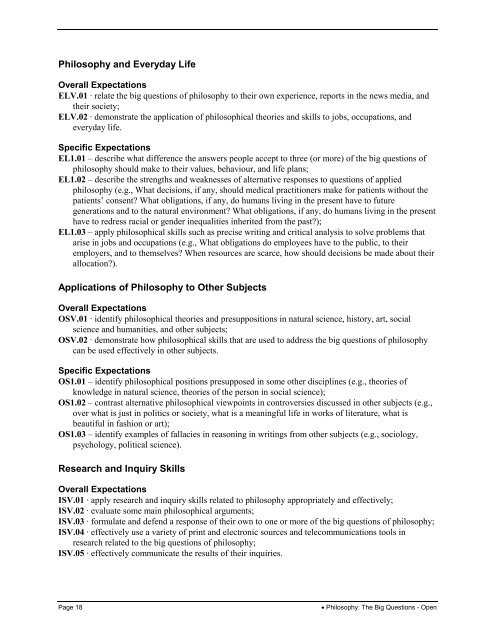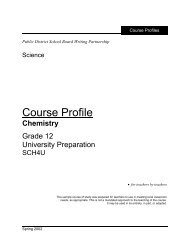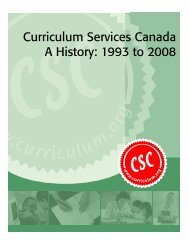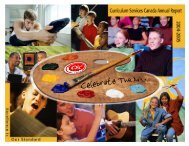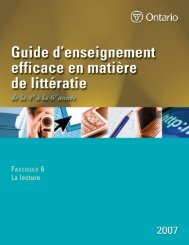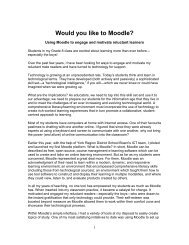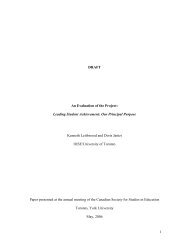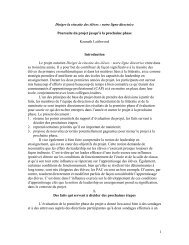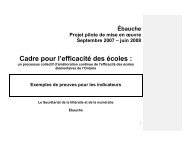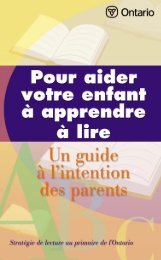Course Profile - Curriculum Services Canada
Course Profile - Curriculum Services Canada
Course Profile - Curriculum Services Canada
Create successful ePaper yourself
Turn your PDF publications into a flip-book with our unique Google optimized e-Paper software.
Philosophy and Everyday Life<br />
Overall Expectations<br />
ELV.01 · relate the big questions of philosophy to their own experience, reports in the news media, and<br />
their society;<br />
ELV.02 · demonstrate the application of philosophical theories and skills to jobs, occupations, and<br />
everyday life.<br />
Specific Expectations<br />
EL1.01 – describe what difference the answers people accept to three (or more) of the big questions of<br />
philosophy should make to their values, behaviour, and life plans;<br />
EL1.02 – describe the strengths and weaknesses of alternative responses to questions of applied<br />
philosophy (e.g., What decisions, if any, should medical practitioners make for patients without the<br />
patients’ consent? What obligations, if any, do humans living in the present have to future<br />
generations and to the natural environment? What obligations, if any, do humans living in the present<br />
have to redress racial or gender inequalities inherited from the past?);<br />
EL1.03 – apply philosophical skills such as precise writing and critical analysis to solve problems that<br />
arise in jobs and occupations (e.g., What obligations do employees have to the public, to their<br />
employers, and to themselves? When resources are scarce, how should decisions be made about their<br />
allocation?).<br />
Applications of Philosophy to Other Subjects<br />
Overall Expectations<br />
OSV.01 · identify philosophical theories and presuppositions in natural science, history, art, social<br />
science and humanities, and other subjects;<br />
OSV.02 · demonstrate how philosophical skills that are used to address the big questions of philosophy<br />
can be used effectively in other subjects.<br />
Specific Expectations<br />
OS1.01 – identify philosophical positions presupposed in some other disciplines (e.g., theories of<br />
knowledge in natural science, theories of the person in social science);<br />
OS1.02 – contrast alternative philosophical viewpoints in controversies discussed in other subjects (e.g.,<br />
over what is just in politics or society, what is a meaningful life in works of literature, what is<br />
beautiful in fashion or art);<br />
OS1.03 – identify examples of fallacies in reasoning in writings from other subjects (e.g., sociology,<br />
psychology, political science).<br />
Research and Inquiry Skills<br />
Overall Expectations<br />
ISV.01 · apply research and inquiry skills related to philosophy appropriately and effectively;<br />
ISV.02 · evaluate some main philosophical arguments;<br />
ISV.03 · formulate and defend a response of their own to one or more of the big questions of philosophy;<br />
ISV.04 · effectively use a variety of print and electronic sources and telecommunications tools in<br />
research related to the big questions of philosophy;<br />
ISV.05 · effectively communicate the results of their inquiries.<br />
Page 18<br />
• Philosophy: The Big Questions - Open


